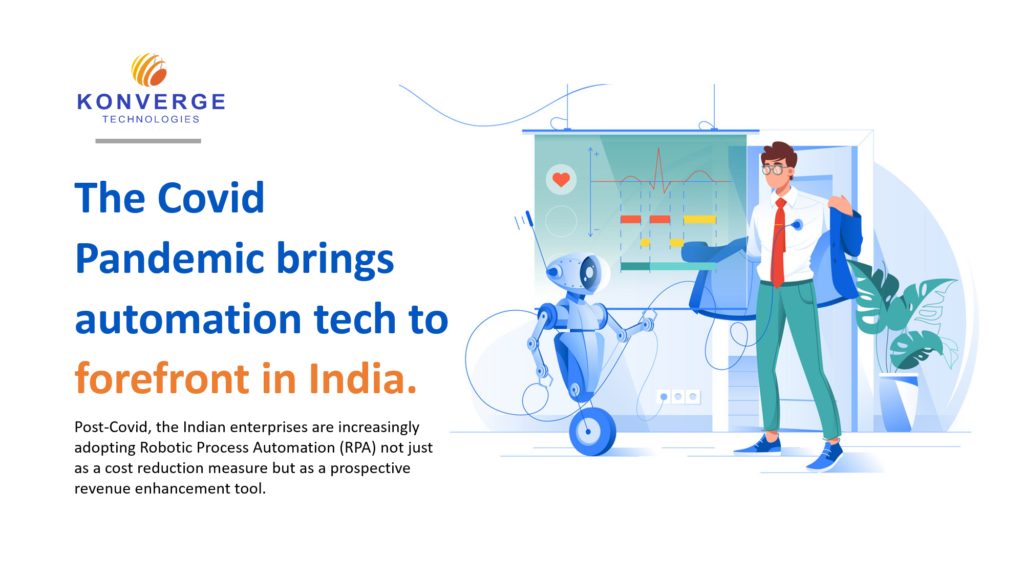
The Covid Pandemic brings automation tech (Robotic process automation and Artificial Intelligence) to forefront in India

Post-Covid, the Indian enterprises are increasingly adopting Robotic Process Automation (RPA) not just as a cost reduction measure but as a prospective revenue enhancement tool.
Introduction
A new IDC study commissioned by Automation Anywhere states that, by 2024, 50% of enterprises in India will embed intelligent automation technology and process development using AI-based software. The IDC report also states that 57% of the Indian enterprises are planning to invest in RPA and Intelligent Automation technologies in order to build resilience post-covid.
The Covid-19 pandemic has fundamentally changed the way businesses are conducted worldwide. With India being one of the heavily affected countries, the impact of the pandemic on the Indian industry is enormous. Restrictions on the movement of people and goods have severely crippled the workforce capacity and disrupted the supply chain.
In a recent survey (April 2020) by Assocham on the impact of Covid-19 on the Indian industry, 79% of the respondents expected that the duration of economic stress on the industry will be more than a quarter. The Assocham report further indicated that 37.6% of the financial actions planned by businesses will be related to implementing cost containment initiatives.
Automation and the New Normal
The Covid pandemic, while making the companies seriously re-evaluate their business continuity strategy, has also made them ponder the ways to recover and successfully emerge on the other side of the new normal. Automation technologies are going to be the key in navigation through these uncertain times. This global pandemic has highlighted the need to accelerate business transformation by wider adoption of new-age technologies such as RPA automation, Artificial Intelligence (AI) and Cloud.
Having witnessed the inefficiency of legacy systems in the wake of the pandemic, the enterprises seek to improve their operational efficiency by digital transformation with an emphasis on Intelligent process automation.
IDC’s Future of Work Employee Survey shows about 55% of employees in India stated that IPA is pertinent to improve productivity. About 45% of employees stated that IPA helps improve efficiency at work. IPA helps achieve such efficiency through the automation of routine tasks by Automation technologies, which results in the freeing-up of resources to focus on business-critical tasks of strategic importance.
What does the Indian industry want to achieve through automation?
The businesses understand that the goal of automation is much beyond reducing the manpower and cost cutting. They realize that automation is much needed to establish digital collaboration, organizational agility, enhanced robustness, efficiency, and flexibility.
The Indian CXOs see automation as a tool to achieve robust management, control, security and audit, and the efficient process governance. They cited trustworthiness as the top priority of business partners for digital transformation. A Senior Executive with an IT-enabled service provider states that “ Automating mundane tasks and IT operations and finance that are driven by people and then upskilling those people, reskilling strategies, using AI/ML technologies for decision making are among the top priorities for our business”.
For effective automation, efficient governance and maintenance of the digital workforce are important. Organizations must develop effective strategies for the governance of bots and data security. The strategy must include regular risk assessments, stress testing, and vulnerability testing.
The Road Ahead
The Indian enterprises are on the road to adopt intelligent process automation. By 2024, the top 100 organizations in India will have formal programs to monitor their digital trustworthiness.
History has always shown us that mankind not just survives but emerges strongly to reach new heights after every great challenge, such as the Great Depression, World Wars, and pandemic outbreaks. Looking at the way the industry, the Indian industry in particular, responds to these times of uncertainty by adopting technology as its key to move forward, the future looks bright and promising.
Recent Posts


Unlocking Employee Potential with Intelligent Workplace Management


